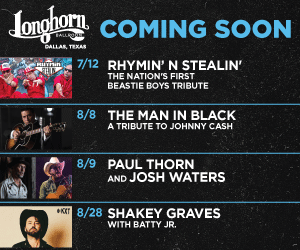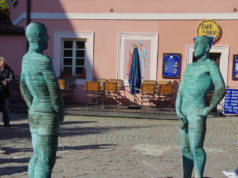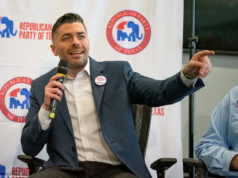Vincent was one of the few people who seemed to have a dog in both the fights that went on in downtown Fort Worth last Saturday.
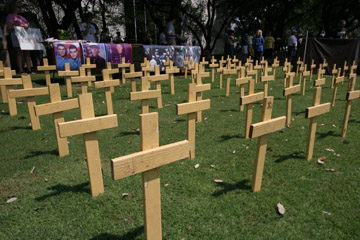 Inside the city convention center, Texas Republicans were conducting a presidential “straw poll,” and Vincent was carrying a Ron Paul campaign sign, drumming up support for the Texas congressman who is a long-shot candidate for the White House but is gaining some support from Republicans who feel disenfranchised by the current party leadership. Outside the convention center, Vincent was discussing the Iraq war with both those who held signs condemning the conflict and those condemning the condemners. The Texans for Peace group decided that a great way to gain publicity for their cause was to hold an anti-war protest outside the convention center in General Worth Square.
Inside the city convention center, Texas Republicans were conducting a presidential “straw poll,” and Vincent was carrying a Ron Paul campaign sign, drumming up support for the Texas congressman who is a long-shot candidate for the White House but is gaining some support from Republicans who feel disenfranchised by the current party leadership. Outside the convention center, Vincent was discussing the Iraq war with both those who held signs condemning the conflict and those condemning the condemners. The Texans for Peace group decided that a great way to gain publicity for their cause was to hold an anti-war protest outside the convention center in General Worth Square.
While the Texas GOP was praising the war effort with patriotic songs and speeches, those outside were parading around bobblehead figures dressed as George Bush, Dick Cheney, and Condoleezza Rice, in prison uniforms and handcuffs. It’s not necessarily strange to have the extremes of the political spectrum voicing their views side-by-side — except in Fort Worth, a city that likes to keep any extremes quiet and unseen. Vincent asked that his last name not be used because he is still on active duty in the U.S Army, at Fort Hood. He served in Baghdad in 2005 and 2006, and is scheduled to be discharged in October. He supports Ron Paul because of the congressman’s anti-war stance. “The officers don’t want to hear anything about how just about everyone serving in Iraq thinks this war is stupid and should have never been launched in the first place,” Vincent said, standing among the protesters. “But my fellow enlisted soldiers are getting tired of me talking about Ron Paul. It’s almost as if they think that it doesn’t matter who is president. But in this election is does, because we don’t need anyone dying anymore for a war that has no real cause.”
Neither the war protest nor the straw poll lived up to the expectations of organizers. The Texas GOP had predicted that 5,000 to 10,000 people would attend their event, but only about 1,300 delegates actually voted. The anti-war group had hoped for a turnout of up to 5,000 people, including as many as 3,000 Ron Paul supporters. In reality, there were never more than 500 listening to the peace advocates at any given time. The numbers may be a predictor of Texas’ relative importance in the 2008 presidential race. The state has 32 electoral college votes, the third highest in the nation, but hasn’t been a presidential campaign battleground in decades. Since 1980, there has been a Bush on the presidential ballot in all but one election, which didn’t make Texas fertile ground for other candidates. Turnout for presidential elections in Texas has also been sparse — about 10 percentage points below the national average in recent elections. And for this straw vote, the top GOP presidential candidates were no-shows.
A low turnout for the straw poll helped make it a disappointing day for the peace-seekers. There were other reasons, too — the Labor Day weekend, the opening of football and dove-hunting seasons (though the last may not have had much effect on the peace group’s turnout). “We planned this specifically in Fort Worth to take advantage of the media interest and the political aspects of the straw poll,” said local Texans for Peace volunteer Doreen Geiger, who was a candidate for Tarrant County chair of the Democratic Party last year. “But when the top [GOP] candidates didn’t show up, the national media didn’t bother coming either. Then it rained in the morning. And no matter what is happening, people in Fort Worth don’t come out when it is raining.”
But actions by Fort Worth police may also have had some effect on the anti-war protest. Geiger said she had contacted the police and city parks departments about the event beginning in mid-July, and had the proper permits and support facilities — portable toilets, free bottled water, a speaker’s stage and booths — to satisfy city requirements. Texans for Peace had asked the city to close off Main Street near the convention center, and planned to put its stage in the street, along with canopied booths lining the curbs. Orgaizers had also received permits from the city to set up some tables and booths within the adjacent park.
But on the morning of the rally, police came by at 8 a.m. and made the Texans for Peace change their event’s configuration, even mandating that the organizers could not have an “anti-government or anti-Bush” message from their speakers. Geiger said police told the organizers they could use the street, but only if there was no anti-government message. The explanation police gave, said rally organizers, was that the police controlled the street, while the parks department controlled the General Worth Square. “They told us that any anti-government or anti-Bush message would mean that the city endorses such ideology, and they would pull the plug if they heard any of that,” said Alyssa Burgin, spokeswoman for Texans for Peace. “Quite frankly, we were all shocked, especially as this came a few hours before our event.”
The organizers brought in a lawyer, who quickly read the contracts Texans for Peace had signed with the city. After several hours of negotiations and interpretation, it was decided that the stage and the booths would be set up in the park and not in the street, and that police would have no control of the content if the event was staged on parkland, and not in the street.
Fort Worth Police Sgt. Clay Buckelew, who dealt with the Texans for Peace in planning the protest, said the rules were changed for two reasons. “They had initially told us there were going to be just a few hundred people, and then a few days before they were saying there were going to be 5,000,” he said. “We had to keep the street open in case there were emergency vehicles needed. “But they also said this was going to be a non-partisan rally, and it became quite clear it wasn’t going to be that,” Buckelew said. “They had rented the park and they could do whatever they wanted there. But they did not rent the street, and it would make it appear that the city of Fort Worth was condoning their views if we allowed them to hold their protest in the street. We had to stay neutral.”
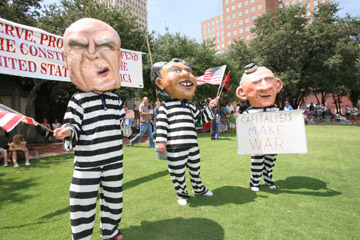 Geiger maintained that the event was nonpartisan. “We specially wanted this to be nonpartisan, nonpolitical,” said Geiger. “We didn’t care if anyone was Republican or Democrat, or anything in between. We just wanted this to be an anti-war event, with an anti-war message. But it was so crazy that everything was changed at the last minute. The police said they would pull the plug if they heard an anti-government message on the street, but wouldn’t if we were in the city park a few feet away. It really doesn’t make much sense.” In the end, police did allow both anti- and pro-war factions to parade their signs in the street. There were no confrontations. Most pulled out their cell phones and digital cameras to take pictures of each other, and both sides defended the opposition’s right to free speech. Fort Worth police monitored the protests quietly, and there were no arrests.
Geiger maintained that the event was nonpartisan. “We specially wanted this to be nonpartisan, nonpolitical,” said Geiger. “We didn’t care if anyone was Republican or Democrat, or anything in between. We just wanted this to be an anti-war event, with an anti-war message. But it was so crazy that everything was changed at the last minute. The police said they would pull the plug if they heard an anti-government message on the street, but wouldn’t if we were in the city park a few feet away. It really doesn’t make much sense.” In the end, police did allow both anti- and pro-war factions to parade their signs in the street. There were no confrontations. Most pulled out their cell phones and digital cameras to take pictures of each other, and both sides defended the opposition’s right to free speech. Fort Worth police monitored the protests quietly, and there were no arrests.
Inside the convention center, the only controversy of the day occurred when some Paul supporters booed other candidates while they spoke — and were drowned out in turn by the patriotic anthems and Wal-Mart commercials shown on the big screen. (Wal-Mart was one of the event’s main corporate sponsors.) Paul drew the most supporters, but not the most voters — only those who had been delegates to past national or statewide GOP conventions could vote. The winner turned out to be U.S. Rep. Duncan Hunter of California. Outside at the anti-war rally, Vincent made his way to a man holding a sign that said “Rational Americans Support our Defenders. Protesters Support and Inspire our Enemies.” Neill Wilkerson of Granbury held the sign, and defended his position to the Iraq War veteran. “Iraq is the front line,” said Wilkerson. “This is all about stopping terrorists acts around the world, and keep them from happening here.” “But we created the front line,” Vincent responded. “And our actions have increased the number of terrorists in Iraq and throughout the world.”
Standing nearby was Nathaniel Batchelder of Oklahoma City, who held an “Oklahomans for Peace” sign. He told Wilkerson he disagreed with his views but supported his right to free speech. “We won’t have free speech if won’t don’t defeat the jihadists,” Wilkerson said. The only group that apparently missed the free-speech message that day was the Fort Worth police. The peace group got the picture. “We won’t be coming back here for any permitted protest, that’s for sure,” said Geiger.
You can reach Dan McGraw at
dan.mcgraw@fwweekly.com.



